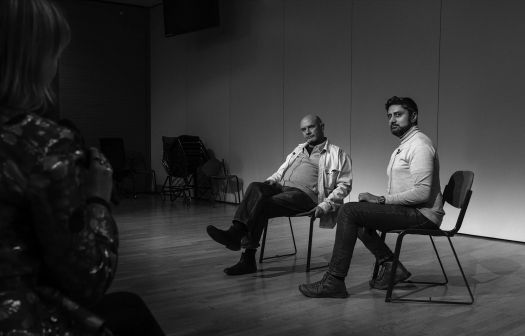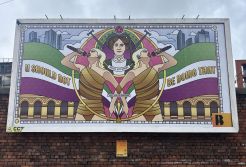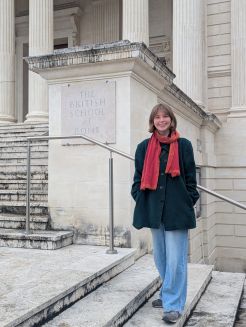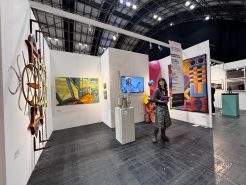‘If it stays the same, it’s probably time to stop’
9 May 2025
Manchester Met's experimental art series Bunker Talks hits its 150th event: so how did we get here?
“There’s no format, there’s no script, there’s no set way of presenting, only their way of presenting,” Professor Michael Pinchbeck explains. We’re talking about Bunker Talks —the joyfully experimental art talk series Pinchbeck, the co-lead of the Performance Research Group, set up shortly after arriving at Manchester School of Art. It’s a series where artists, creatives and academics as varied as art critic Jurriaan Benschop, body artist Franko B and performance maker Ellie Harrison hold forth about everything from collaborating with doctors and (literally) bleeding for your performance art to sampling 100-year-old Bakelite records. While there’s no set structure for how these talks should play out, Pinchbeck sees the series as taking the pulse of art today. How successfully it does this could be implied by the format’s sheer longevity. This week, the 150th event — a conversation about AI with scriptwriter and former BBC script editor Ray Grewal — took place. Clearly, monitoring the creative world is a marathon, not a sprint.
The first Bunker Talk took place in February 2020 — Pinchbeck explains the name was a reference to the bunker-like environment of the basement lecture theatre of 70 Oxford Road (the former Cornerhouse cinema), with its “slightly degraded, post-apocalyptic aesthetic”, rather than to the pandemic. He launched it with a ‘bunkerfesto’, manifesting the talks he wanted to see into being with statements like “The bunker is a subversive space. The bunker is revolutionary space. The bunker is present tense.”
Pinchbeck had begun working at Manchester School of Art one month earlier and had been eager to create “something that could have some legacy”, rather than a one-off event. While he repeatedly stresses how much other academic staff have contributed to the series (they’ve hosted, starred in, and curated talks) it’s hard not to see Bunker Talks as a reflection of Pinchbeck himself. With its creator hailing from a devised theatre background — in which there’s no script and an ensemble work together to improvise a show — there’s a similar make-it-up-as-you-go-along feel to the talks, in which the audience help shape them.

But part of this improvisatory spirit is surely as much about location as devised theatre. While Covid-19 meant the initial talks took place online, on returning to campus, Pinchbeck wanted to find a home for the talks that wouldn’t feel too institutional: cue taking it to the Salutation, the pub on Higher Chatham Street on campus. Established in the 1820s, the red-brick pub has welcomed artists as varied as Charlotte Bronte, who started writing her novel Jane Eyre during a stay there and Mancunian alt-pop star Frank Sidebottom — making it a particularly storied place to host the talks. “It feels like quite an anarchic space, a chaotic space. I like having that history around us, and then you’ve got SODA over the top of us, too,” he says.
This creativity seems to bleed into the formats of the talks — he cites performance maker Melanie Wilson playing “ethereal AI-generated electronica” as an immersive audio experience, before fielding questions about the music, or fashion designer Andrew Ibi opening his talk with a DJ set. “I really like things like that that change the format — you think you’re coming to a talk, but it’s actually a gig.” In essence, they’re trying to change it up each time. “If it stays the same, it’s probably time to stop.”
As the years have gone by, the talks have drawn bigger and more far-flung audiences. While Pinchbeck had hoped to host the Dutch writer Jurriaan Benschop at the Salutation, the talk sold out because so many local painters wanted to come to it (Benschop authored the 2023 book Why Paintings Work) and had to be moved to the Lowry Building. Similarly, when Dan Dubowitz, a reader in architecture, spoke to Sam Jarrett from Landsec, a real-estate Goliath that has redeveloped vast swathes of Manchester, people came from London and Liverpool to attend the event. “It’s great they do that — they could also just watch the recording,” Pinchbeck remarks. “But I think some of this is about networking as well — we’re offering this social environment.”

The story of the talks has been one of broadening: Bunker Talks’ focus started out as mainly performance research, grew to art and performance research, and is now a faculty-wide research project. It is still curated by members of the Performance Research Group. “So how does it grow and how does it change?” One way to solve this is by taking it to different locations in the near future: potentially the Poetry Library, Manchester Met’s theatre spaces and lecture theatres, though it’s key to Pinchbeck to retain the social element that makes the series so distinctive — if it felt like a lecture, it wouldn’t be a Bunker Talk. Zodwa Nyoni, a lecturer in scriptwriting and playwright, has also suggested artists with a multidisciplinary focus for the talks to come: “So, a speaker who is a writer and a beatboxer or a playwright who is an economist”. This is exactly what the bunker is particularly good at, he claims — letting us come out of our subject-specific silos and explore other disciplines, and the spaces between our disciplines. This is where the most interesting and dynamic conversations happen, he believes.
While the name of the talk series seemed grimly appropriate during the pandemic, geopolitical chaos has only accelerated further in the last half decade. This makes the series particularly essential in the current moment, Pinchbeck argues, since we’re dealing with uncertainty all the time. “Whether as a poet or a playwright, we all start with an empty page and the unknown is what we have to wrestle with to get to something that we want to share. In this time, it can sometimes be a reassuring experience to hear artists talk about how they navigate the unknown — we’re all doing that now.”
Want to see a Bunker Talk for yourself?
- On Tuesday 3 June, in the talk ‘Looking Back, Moving Forward - Creating, Collecting and Conserving Art in Manchester’, Manchester Art Gallery curator Hannah Williamson will be in conversation with painter and Manchester Academy of Fine Arts archivist Pete Davis and online gallery owner Wendy Levy.
- On Tuesday 1 July, performance maker and climate playwright Dr Lena Šimic will be in conversation with James Marriott, an artist who works as part of Platform, a London-based arts, human rights and environmental justice organisation. They will discuss theatre making and the climate crisis.



